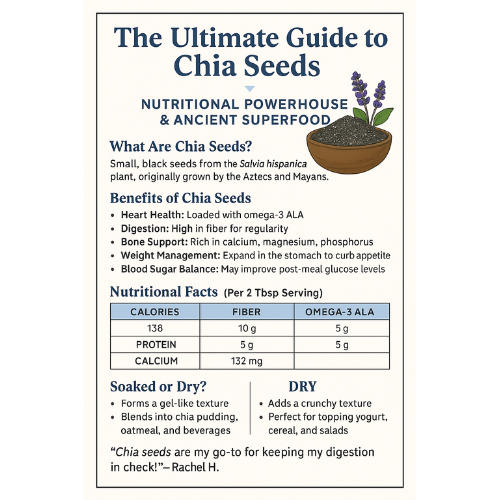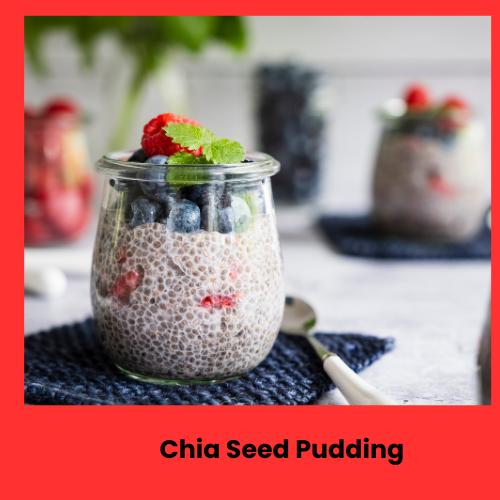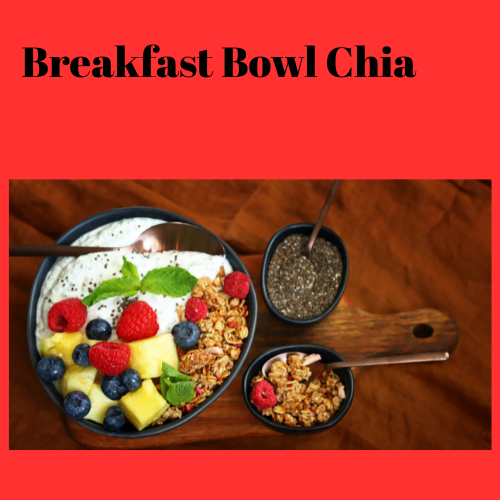

What are chia seeds good for?
Chia seeds are packed with fiber, plant-based omega-3s, and minerals that support heart health, digestion, bone strength, and stable blood sugar. They're easy to use in puddings, smoothies, and baking—and even help reduce cravings.
 Why Chia Seeds Are More Than Just a Trend
Why Chia Seeds Are More Than Just a TrendChia seeds (Salvia hispanica) are everywhere—from Instagram-worthy smoothies to top-rated health blogs—but their story didn’t start in a wellness café. These tiny seeds were once prized fuel for Aztec and Mayan warriors, who consumed them for sustained energy, strength, and stamina during battle and long journeys.
The word chia actually comes from the ancient Nahuatl word chian, meaning “oily”—a nod to their incredible omega-3 content. For centuries, they were used not just as food, but also as medicine, offerings to the gods, and even currency in ancient Mesoamerica.
Fast forward to today, and chia seeds have made a powerful comeback—not because of hype, but because they actually work. Unlike trendy supplements that promise the moon but fizzle out fast, chia seeds deliver consistent, research-backed benefits for modern challenges like:
Gut issues like bloating and irregularity
Blood sugar spikes and energy crashes
Cravings driven by imbalanced hormones or skipped meals
Nutrient gaps in plant-based or busy lifestyles
What sets chia seeds apart is their unique ability to absorb up to 12x their weight in water, forming a gel that slows digestion, keeps you full longer, and gently supports blood sugar stability. This alone makes them a natural solution for insulin resistance, metabolic health, and satiety—without side effects.
They’re also one of the rarest plant sources of complete protein, containing all nine essential amino acids. And unlike flax seeds, chia doesn’t need to be ground to be absorbed. It's shelf-stable for years, versatile in recipes, and accessible to nearly every diet—from keto to vegan.
In short:
Chia seeds aren’t just a passing fad—they’re a time-tested, research-supported superfood with ancient roots and modern science to back them up.
| Nutrient | Amount |
|---|---|
| Calories | 137 kcal |
| Protein | 4.4 g |
| Fat | 8.6 g |
| Omega-3 (ALA) | 5.1 g |
| Carbohydrates | 12.3 g |
| Fiber | 10.6 g |
| Calcium | 177 mg |
| Magnesium | 95 mg |
| Phosphorus | 265 mg |
| Zinc | 1 mg |
Why It Works:
Chia seeds are one of the richest plant sources of omega-3 fatty acids (ALA), plus they deliver fiber that supports digestive health, metabolic balance, and satiety.

Chia’s omega-3s help reduce inflammation and triglycerides, while fiber helps remove cholesterol. Together, they create a cardio-protective combo that supports lower blood pressure and better circulation.
With over 10g of fiber per serving, chia seeds promote healthy bowel movements and feed beneficial gut bacteria. They act as a prebiotic, helping balance your microbiome naturally.
Chia seeds contain more calcium gram-for-gram than most dairy products. Magnesium and phosphorus also support mineral absorption and bone density—ideal for plant-based or dairy-free diets.
When soaked, chia forms a gel-like coating that slows digestion, reducing blood sugar spikes. Studies show chia seeds may improve insulin sensitivity and are a smart addition for those with type 2 diabetes or prediabetes.
Chia’s neutral flavor and gelling properties make it one of the most versatile superfoods you can stock.
Chia Pudding – Soak 3 Tbsp chia in 1 cup almond milk + cinnamon overnight
Smoothies – Add 1 Tbsp to thicken and boost fiber
Egg Replacement – 1 Tbsp chia + 2.5 Tbsp water = 1 egg
Homemade Jam – Simmer berries + chia for 10 min = no-sugar jam
Sprinkle on Everything – Oatmeal, salads, soups, and baked goods
| Feature / Benefit | Chia Seeds | Flax Seeds | Hemp Seeds |
|---|---|---|---|
| Omega-3 Content | ✅ High in ALA (2,457mg/serving) | ✅ Highest ALA (6,388mg/serving) | ❌ Low (mostly omega-6s) |
| Protein per 28g | 4.4g | 5.1g | ✅ 9.2g (complete protein) |
| Fiber | ✅ 10.6g (mostly soluble) | ✅ 7.7g (mainly insoluble) | ❌ Low (1.2g) |
| Best For | Gut health, blood sugar, hydration | Hormones, digestion, omega-3 boost | Energy, muscle support, keto diets |
| Bioavailability | Eaten whole or soaked | Must be ground for full absorption | ✅ Easily absorbed as-is |
| Texture in Food | Gel-like when soaked (puddings, etc.) | Mild, nutty—adds crunch to baked goods | Soft, nutty—great in smoothies or salads |
| Taste | Mild, neutral | Mildly nutty | Rich, earthy, buttery |
| Prep Tips | Soak for best digestion + fullness | Grind for maximum nutrient use | Use raw or lightly toasted |
| Calories (per 28g) | 137 | 150 | 161 |
| Calcium (per 28g) | ✅ 177mg | 71.4mg | 21mg |
| Magnesium (per 28g) | 95mg | 111mg | ✅ 210mg |
| Iron | ✅ Good source | Moderate | ✅ High |
| Shelf Life | Long (due to antioxidants) | Shorter once ground | Medium |
| Traditional Use | Aztec/Mayan endurance & hydration | Ayurvedic & hormone balance | Chinese + Ayurvedic tonic food |
Q: Are chia seeds good for weight loss?
Yes—chia swells in your stomach to help you feel full longer and reduces sugar cravings by slowing digestion.
Q: Should chia be soaked before eating?
Soaking is recommended for digestion, but dry chia is safe in small amounts (like sprinkled on oatmeal or yogurt).
Q: How much chia should I eat daily?
Start with 1–2 Tbsp/day. Some people tolerate up to 4 Tbsp/day without issue, especially when well hydrated.
Q: Can chia seeds go bad?
Stored in a cool, dry place, chia seeds can last up to 2 years due to their natural antioxidants.
Soaked chia seeds form a gel-like coating when combined with water, which makes them easier to digest, gentler on the stomach, and more effective at promoting hydration and fullness. This gel slows down digestion, helping to stabilize blood sugar levels and curb cravings—ideal for weight loss, energy balance, and gut health.
Dry chia seeds, while still nutritious, may be harder for some people to digest. If eaten without liquid, they can absorb water from the digestive tract, potentially causing bloating or discomfort—especially in people with sensitive digestion or low fluid intake.
 Best Use:
Best Use:Use soaked chia for puddings, smoothies, hydration, and blood sugar balance.
Use dry chia for baking, sprinkling on yogurt, or when mixed into moist foods like oatmeal.
Best for Fiber & Satiety: Chia Seeds
Best for Omega-3s: Flax Seeds (when ground)
Best for Protein: Hemp Seeds
Best Overall Versatility: Chia (due to shelf-stability, easy prep, and broad benefits)
Tiny? Yes. But chia seeds punch far above their size when it comes to your health. Whether you're looking to improve heart health, manage blood sugar, or simply stay full longer between meals—chia seeds deliver on every front.
And the best part? They're easy to add to just about anything.
“I call it my little miracle seed.”
“Since adding soaked chia seeds to my morning routine, my digestion has never been better. I feel full longer, and I’ve actually stopped craving sugar mid-morning!”
— Emily R., Portland, OR
“Helped me lose 9 pounds—without changing much else.”
“I started using chia in smoothies and overnight oats. The fiber really helps me feel satisfied. I was shocked how much less I snacked!”
— James T., Atlanta, GA
“More energy, better skin, and it’s so easy to use.”
“I never believed a seed could make a difference, but my energy has gone up and my skin looks clearer. I just soak it in coconut milk overnight—it’s delicious!”
— Priya D., San Jose, CA
References:
https://www.ncbi.nlm.nih.gov/pmc/articles/PMC6994964/
https://fdc.nal.usda.gov/fdc-app.html#/food-details/170554/nutrients
https://www.medicalnewstoday.com/articles/291334
PubMed Study:
Effect of chia seed supplementation on blood pressure and lipid profile
Chia improves glycemic control in type 2 diabetes